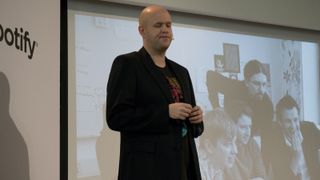Spotify, wake up: there's not a Whole Lotta Love for music exclusives
There's been a Communication Breakdown - exclusives are bad for digital musc

Daniel Ek can hardly conceal his glee. The 30-year-old founder of the world's fastest-growing music service is announcing with a big grin on his face that only Spotify users will be able to stream the music of one of his favourite bands, Led Zeppelin.
Led Zeppelin have been digital holdouts for years. The influential aging rockers only agreed to let Apple sell their music through iTunes in 2007 and until now it's never been streamable on any legal music services.
With this deal, however, music fans will be able to listen to their favourite Led Zep records anywhere at any time on Spotify.
Whole lotta love
"By signing an exclusivity deal with Led Zeppelin, Spotify is opening up a Pandora's box that's going to hurt consumers in the long run."
That's great and everyone's happy, right?
Well, things are a little more complicated than that. Spotify's definitely happy - the grin in Daniel Ek's face confirms that.
Music fans don't really care, because if they love Led Zeppelin that much then they're already listening to versions ripped from CD (or pirated). Led Zeppelin are probably a bit happier because they're getting an extra source of income, albeit one that's fairly small.
Get daily insight, inspiration and deals in your inbox
Get the hottest deals available in your inbox plus news, reviews, opinion, analysis and more from the TechRadar team.
Other streaming music providers, on the other hand, are probably fuming. Fuming because they've been prevented from competing with Spotify on a level playing field: why would a Led Zeppelin fan now sign up with Rdio, or Google Play All Access Music? Or the forthcoming YouTube or Beats streaming music services?
Spotify is using its weight in the market to force consumers to worry about more than just how good the streaming is. It's forcing them to ask a question that hasn't been necessary to ask for a few years: "Will it have my favourite band?"
That's a dangerous game to be playing with an ecosystem that's only just, as Daniel Ek puts it, "stabilising and getting back on its feet".
Dazed and confused
Spotify's early growth was in large part because it had almost everything. If musicians get a whiff of money and think they might be able to sell their rights to the highest bidder, we'll rapidly end up in a situation where music fans have to pay five different subscriptions to listen to what they want to hear. That's not good for anyone.
We're seeing that situation right now in streaming TV and movies. Netflix and Amazon - not to mention Microsoft, and Sony - are in an exclusivity arms race, even going as far as to start commissioning their own shows so that the rights can't ever be shared with competitors.
As a result, streaming video is taking a lot longer to establish itself as a viable industry than music ever did.
It's not like Spotify hasn't been burnt before in a similar way: Apple has an exclusivity agreement with the Beatles that prevents the Fab Four's music appearing on any other digital music service - that's on reason why you can't listen to the Beatles on Spotify yet.
Right now, Spotify is the only player in the streaming music market that's got the weight to make those kinds of deals. But what if a new player in the market, backed with big money - like, say, Beats or Google - approached a famous musician and offered to bankroll their new album if they'd make it exclusively for them? That's definitely not out of the realms of possibility.
Some musicians might not even need the cash - Dre owns Beats. If he launched his streaming music service with an exclusive new album that would really kick Spotify where it hurts and line his pockets for the next few years.
In short, by signing an exclusivity deal with Led Zeppelin, Spotify is opening up a Pandora's box that's going to hurt consumers in the long run.
Instead of battling over libraries, Spotify should be putting all its energies into making the best music streaming service possible for its customers. That's something that everyone, in all parts of the music industry, can grin about.

